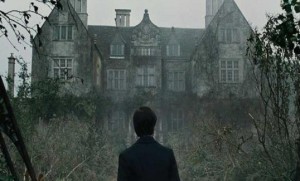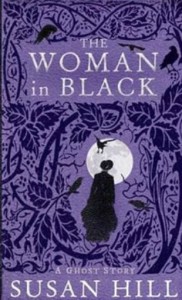 “The Woman in Black” by Susan Hill has earned its place as one of the finest English ghost stories of the last quarter century. The novella has been adapted into two films, with another movie sequel in the works, and a stage play that has become the second longest-running production in the history of London’s West End.
“The Woman in Black” by Susan Hill has earned its place as one of the finest English ghost stories of the last quarter century. The novella has been adapted into two films, with another movie sequel in the works, and a stage play that has become the second longest-running production in the history of London’s West End.
I first heard about “The Woman in Black” when I saw the preview for the film adaption staring, Mr. Harry Potter himself, Daniel Radcliffe back in 2012. During safe daylight hours, I watched the film with a friend and we were both chilled to the core. I did not sleep well that night and am woman enough to say that I slept with the light on.
It wasn’t your typical ghost story…
Among the sweeping vistas of a seaside town, an old, looming estate lays vacant on the northeastern coast of the UK. Eel Marsh House holds dark secrets that an unsuspecting solicitor is about to become entangled with.
Attorney Arthur Kipps journeys to the small English town of Colchester to wrap up the final affairs of the deceased widow and owner of Eel Marsh House. Upon arrival, he notices something very odd about the quaint village.
At the widow’s funeral, he sees a woman dressed in a typical black mourning style dress. Not thinking too much of the occurrence, he becomes uneasy upon noticing that she appears almost wherever he goes. The townspeople are reluctant to give Kipps any information about her. But Kipps is able to gather that everytime someone sees her a tragedy befalls a child in the village.
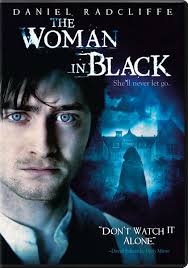 As the story progresses the viewer discovers the dark past of the troubled woman in black. The horrors she endured revolve around her son and in turn make her an extremely vengeful ghost — probably the most terrifying in Gothic literature. She takes no prisoners. Not even innocents.
As the story progresses the viewer discovers the dark past of the troubled woman in black. The horrors she endured revolve around her son and in turn make her an extremely vengeful ghost — probably the most terrifying in Gothic literature. She takes no prisoners. Not even innocents.
The movie was disturbing and became the forefront subject in my mind. Sometime after I saw the film, I was pleasantly surprised to find a copy of the novella in a bookstore. Even more exciting to see was that the author Susan Hill was English. (self-professed Anglophile right here!)
After finishing the book in a fervor, I kept musing over the differences between the novella, the film, and story’s specific inter-workings. What was its allure factor that had captivated a global audience? I came up with the top five reasons why “The Woman in Black” has remained a timeless piece and the best English ghost story ever written:
1) What makes this story so provocative in general is how menacing the ghost is. Usually in ghost stories there is some type of grace given to the main character if they help the ghost lay at rest. Not here. No matter what you do for the woman in black, when you cross her path, destruction lies in wait, amplifying the scare factor.
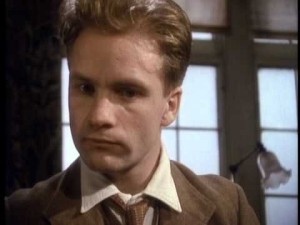 She also shows up everywhere, even over your bed in the 1989 film adaption, which ironically stars Adrian Rawlins (Harry Potter’s father in the HP films). Not everyone can see her though. Just the main character. The reader can’t help but feel trapped and terrified as they lie in wait for her next appearance.
She also shows up everywhere, even over your bed in the 1989 film adaption, which ironically stars Adrian Rawlins (Harry Potter’s father in the HP films). Not everyone can see her though. Just the main character. The reader can’t help but feel trapped and terrified as they lie in wait for her next appearance.
Just how powerful is the scare factor of “The Woman in Black?” Stuart Heritage a writer for “The Guardian” recaps the stage play in these words:
Likewise, Hill herself has said:
Thankfully the novella is more downplayed than the stage play and film — my scare factor threshold is low. The Daniel Radcliffe adaption also took obvious creative visual license to sensationalize the creep factor (makes sense given the target audience).
2) Drawing on tactics used by classic authors W.W. Jacobs, J. S. Le Fanu, and M. R. James, in the book Hill holds any gore at bay. Instead she relies on the power of suggestion and hushed, unexplained perceptions against a desolate, gloomy atmosphere. This serves to catapult the psychological impact of the story.
The other added benefit of the novella versus the Radcliffe adaption was that it was easier to see Kipps’ motivations of why he returns to Eel Marsh House mid-story. Kipps should’ve just upped and ran in the Radcliffe adaption. The film didn’t seem quite clear on his reasonings, but this dilemma is given more explanation through interior monologue in the book.
3) Moving on, not only was the pacing excellent in the novella and the plot easy to get lost in, but there was an interesting paradox. The backstory of the woman in black makes one sympathize for her, yet you can’t help but feel terrified by the things she does. It’s enough to drive you mad. Using this kind of catch-22 is one of the greatest literary devices to glue readers to the page.
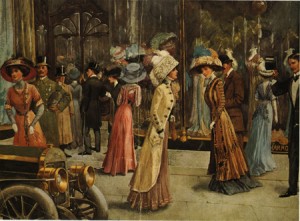 4) Susan Hill’s other trick of the trade is the execution of her prose. Her delicious, vivid, lyrical style draws you in from page one. The voice genuinely sounds like Hill has transported you back to Edwardian England yet its merit lies in its accessibility to a modern audience.
4) Susan Hill’s other trick of the trade is the execution of her prose. Her delicious, vivid, lyrical style draws you in from page one. The voice genuinely sounds like Hill has transported you back to Edwardian England yet its merit lies in its accessibility to a modern audience.
Hill then packages nods to the Victorian and Edwardian masters of suspense all throughout the text. Specifically, the novella is in the style of Henry James’ “The Turn of the Screw” and also has a Dickens-esque flavor. The novella even opens on Christmas Eve with Arthur Kipps’ family telling ghost stories. Fireside ghost story sharing during the holidays was a common Victorian tradition and this is also how “The Turn of the Screw” begins.
5) And last, but not certainly least, did I mention the rocking chair?! *screams* Check out the trailer below.
“The Woman in Black” truly is classically modern Gothic treasure. Wonderfully crafted, it is the perfect ghost story to read again and again and is part of my top ten favorite books of all time.
If you’ve read or seen “The Woman in Black,” or have a favorite ghost story title to share, please leave a comment! It’s great to hear other’s opinions on the genre.
Thanks for stopping by, and be sure to check back for more upcoming news as well as updates on my forthcoming fantasy novel, “The Last Wizards of Tynedale”, with my co-author, John Bladek. And if you’d like to be alerted of upcoming giveaways and magical news, sign up for my seasonal newsletter at the bottom of this post. (I don’t sell email addresses, btw. No one likes that, especially me.)
Thanks for reading!
Stay magical,
Davonna

